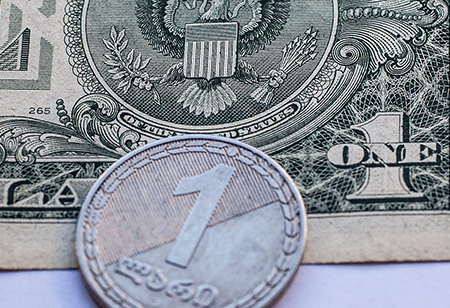Lari appreciates: 1 USD equals 2.3276 GEL
After NBG sells $40m at Foreign Exchange Auction

The National Bank of Georgia (NBG) has sold millions of dollars at the Foreign Exchange Auction to control the changing value of the national currency against the US dollar.
Today Georgia’s central bank sold $40 million USD at the Foreign Exchange Auction to try curb depreciation of the Georgian Lari (GEL) against the US dollar.
After NBG sold the dollars, the weighted average exchange rate saw 1 USD equal 2.3264 GEL.
This was the 15th intervention this year since the Lari started depreciating in 2014.
Through the bank’s actions, the Lari will appreciate in value. Today’s rate was 1 USD equals 2.3345 GEL, while tomorrow, September 28 1 USD will equal 2.3276 GEL.
Meanwhile tomorrow 1 Euro will cost 2.6174 GEL, down from the previous rate of 2.6247 GEL.

This is a graphic by Bloomberg were you can see a comparison of the national currency rate within the last month. The comparison graphic was made online today at 5.46pm Tbilisi local time using a tool from www.bloomberg.com.
The main goal of the Foreign Exchange Auction is to fill international reserves, to eliminate the pressure on the exchange rate due to high temporary inflows of foreign capital or to balance the private and government gap,” said NBG.
To keep the country’s foreign exchange reserves at a stable level, NBG periodically intervened on the foreign exchange market and purchased (or sold) foreign currency.
It must be noted that this intervention increases the money supply. If intervention creates inflationary risks, NBG conducts sterilisation via open market operations,” said the Bank.

This graphic shows the changing Lari rate against the US dollar over the past year. One year ago 1 USD cost 2.3550 GEL while in February 2016 the Lari's depreciation hit its peak. At that time 1 USD equalled 2.5000 GEL. The comparison graphic was made online today at 5.46 pm Tbilisi local time using a tool from www.bloomberg.com.
Furthermore, Government operations carried out in a foreign currency also created the need to intervene in the foreign exchange market, said NBG.
NBG represents the Government’s banker therefore Government accounts are opened in the National Bank. Hence, the inflows and outflows of Government funds are managed through the NBG and Government accounts bypass the foreign exchange market.
As a result of this, despite the country’s balanced Balance of Payments, the private sector might have a negative foreign balance and the state a positive balance. In this case, to balance the gap the National Bank of Georgia will sell foreign currency via a Foreign Exchange Auction and vice versa,” the Bank explained today.
 Tweet
Tweet  Share
Share